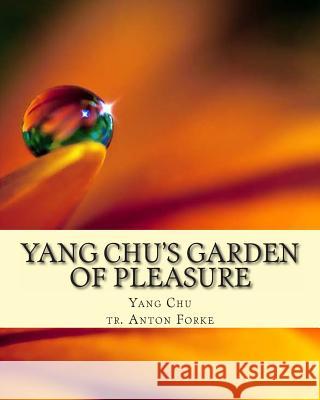Yang Chu's Garden of Pleasure » książka
Yang Chu's Garden of Pleasure
ISBN-13: 9781463514808 / Angielski / Miękka / 2011 / 64 str.
Yang Chu was a philosopher of the classic age of Chinese thought who probably lived in the 300's B.C.E. He has been associated with the Taoists since the rise of official Confucianism and the consolidation of what we now call 'Taoism', although this term is problematic, as thinkers like Yang Chu, Chuang Tzu, and Lao Tzu are quite different and were not considered to be members of a single school in ancient times. Yang Chu directed his thought to attainment of the spiritual self through self-expression and finding contentment. Man craves the pleasures of the world and gratification of desire through such things as fine food and beautiful objects; to yield to these cravings for self-gratification is to seek the original spiritual nature (Liu: 1967: 358). Although his detractors present him as an hedonist, epicurean, and egoist, Yang Chu was, according to contemporary sources, an early Daoist teacher identified with a new philosophical trend toward naturalism as the best means of preserving life in a decadent and turbulent world (Liu: 1967: 358). All beings, thought Yang Chu, have the survival instinct, but man, the highest of creatures, lacking the strength of animals, must rely on intelligence to survive rather than strength. He felt that strength was despicable when used against others (Liu: 1967: 358).
Zawartość książki może nie spełniać oczekiwań – reklamacje nie obejmują treści, która mogła nie być redakcyjnie ani merytorycznie opracowana.











